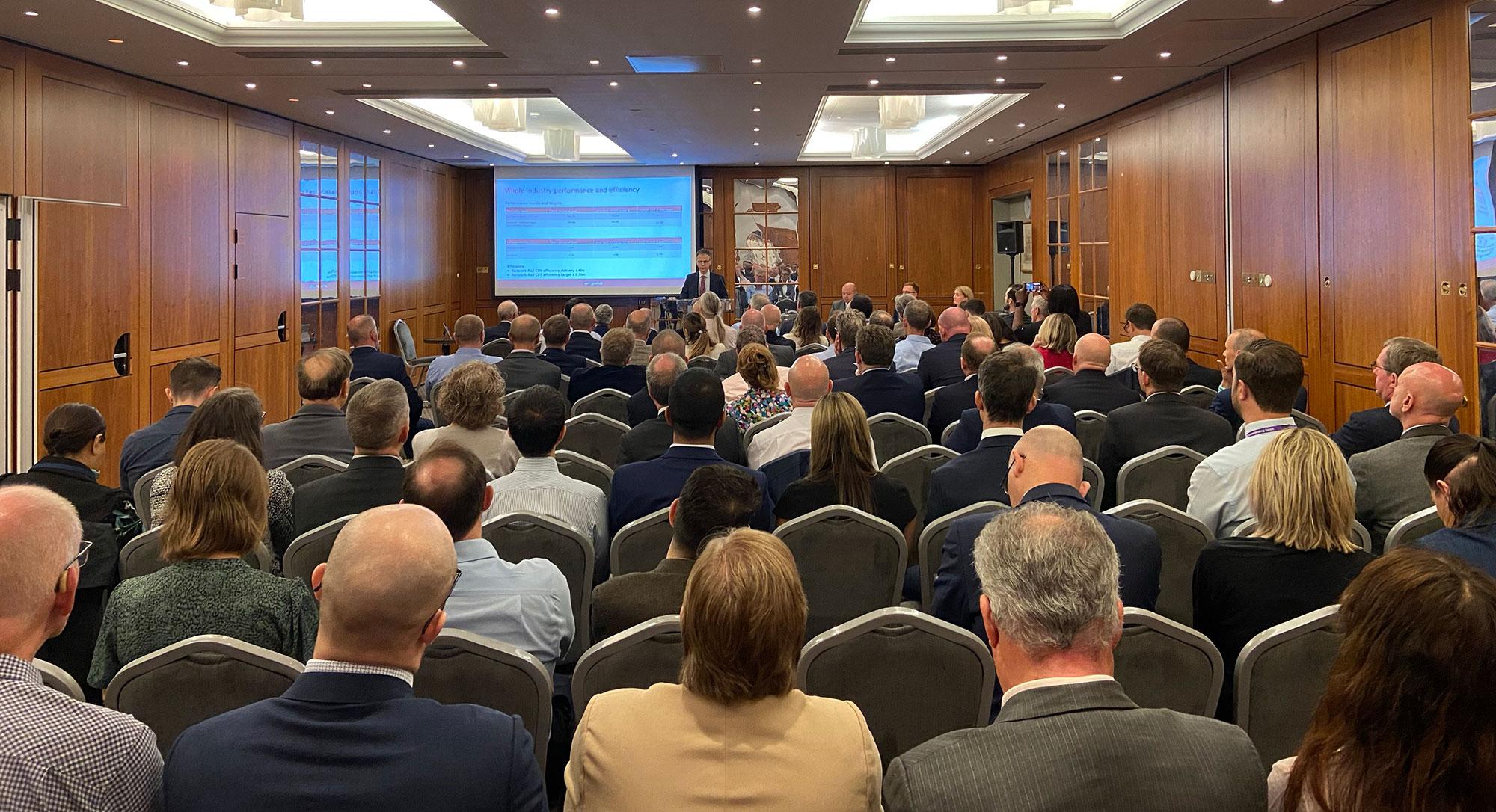
Hello and welcome to the July newsletter
This month I hosted ORR’s annual ‘A Year in Rail’ event. This was an opportunity for us to talk with rail stakeholders about some of the key areas we’ve been working on over the last year, following the publication of our annual reports for the areas that we oversee.
Those reports are an important part of how we hold Network Rail, train operators, and High Speed 1 to account for what they deliver for their customers. They also highlight progress and issues regarding health and safety in the industry. I was pleased to be able to speak with colleagues from across the rail sector at the event and to answer their questions on current issues, including on the year ahead following the election of the new government.
Short summaries of our reports for 2023-24 are set out below, with links to the full reports.
John Larkinson
CEO
Video
Watch the Year in Rail video overview with John Larkinson.
Health and Safety: mixed progress as Control Period 6 ends and climate impacts intensify
2023 to 2024 was an important year for Network Rail (NR) as it signalled the end of Control Period 6 (2019-24), and the start of Control Period 7 (2024-29).
Significant progress has been made in a number of areas through CP6 which include trackworker safety, drainage asset inventories and occupational health improvements.
However, not all commitments were met in full and there is more for the company to do to ensure that necessary improvements are implemented in a timely manner.
This is particularly important given that climate-related changes are having visible impacts on our infrastructure and operations, with the rate of high consequence earthworks failures at its highest since 2008.
On the mainline, we have seen improvements over the year in the investigation of Signals Passed at Danger (SPADs) by dutyholders. However, the number of SPADs that were attributed to drivers increased.
Further work across the industry is required to understand what underpins this growing trend, and subsequently, what more can be done in the intervening period before the European Train Control System, with speed supervision, is implemented more widely.
We continued to push for improved health and safety outcomes on non-mainline railways. Of particular note, we continued with our work to ensure that the Rail Accident Investigation Branch recommendations following the tragic Sandilands tram incident are fully implemented across the tram sector.
Finally, we progressed recommendations from the post-implementation review report of the Train Driving Licences and Certificates Regulations 2010, working closely with the Department for Transport to explore options for improving the efficiency of the licensing regime. We also rejoined the National Safety Authority Network with observer status after being invited back by the European Union Agency for Railways late last year.
Read the full Annual Health and Safety report on our website.
Network Rail Annual Assessment: performance stabilises, and efficiency delivered, but Wales & Western region falters resulting in potential £3m fine
Following a period of declining train service performance, at our request, Network Rail implemented regional improvement plans and performance largely stabilised barring the effects of a severe autumn and winter period.
However, performance in Wales & Western continued to deteriorate to unacceptable levels and following an investigation we found the company in breach of its network licence.
We have required Network Rail to produce a robust plan by 31 August 2024 to remedy this, with a £3m fine to be paid if the plan fails to meet the requirements we set.
Freight performance improved steadily over Year 5 following a particularly poor start. However, delays related to asset reliability continued and Network Rail must make improvements in this area.
Network Rail delivered its efficiency plans for the year and met its target of £4.0 billion of savings for CP6 overall, a significant achievement for the company.
This has been an area of focused scrutiny by ORR over CP6, using leading indicators to track whether the company was on target to meet its efficiencies and enabling us to escalate any concerns at an early stage. However, wider financial performance continued to decline, in part due to performance-related compensation payments to train operators.
Network Rail also largely delivered its network-wide target for effective renewals volumes, but with delivery varying at regional level. Shortfalls in renewals of structures and track have increased pressures on maintaining and renewing core assets in CP7.
Following the tragic events at Carmont in August 2020 and the subsequent Mair and Slingo reports, improvements to the management of drainage assets has been a key focus. We have consistently challenged Network Rail to improve its asset knowledge and drainage management plans, and it has now completed inventories of its drainage assets.
Finally, Network Rail missed its national environmental target. While it performed well against its waste management and carbon emissions reduction targets, it fell short of its targeted 18% reduction in non-traction energy usage. It must now make improvements to support delivery of its environmental targets in CP7.
Read the full Network Rail Annual Assessment on our website.
Consumer: ORR secures passenger-friendly changes while targeting improvements in assistance, lift availability, and complaint resolution
Over the last year we secured increased transparency from online retailers where they charge fees; improvements in the notifications sent to passengers who have bought online when there are changes to their booked train; and a 50% reduction in the maximum refund fee that can be charged when a passenger decides not to travel.
Operators have not however sustained the improvements in delivery of booked assistance that we saw last year. We are developing a new approach to benchmarking their performance that will enable us to hold operators to account more transparently and robustly.
Lifts at stations are key enablers of access to the railway and we have started to publish data on lift performance and launched a review of Network Rail’s processes for lift maintenance and repairs.
This year, as an extension to ORR’s role, we took over sponsorship of the Rail Ombudsman, a free, impartial and independent service that passengers can use to escalate unresolved complaints about train and station operators.
We are now working to improve aspects of the service including through the introduction of new passenger contact channels to provide a more accessible service and improved response times for certain case types to speed up the complaint resolution process.
Our areas of focus for the year ahead include delivering improvements in passenger information for rail replacement buses, provision of live information about lift availability, and the health, safety and welfare of passengers when they are at risk of being stranded on a train for long periods.
Read the full Consumer Report on our website.
Top stories
ORR needs Network Rail to produce robust performance improvement plan for Wales & Western region or face £3m fine
On 29 November 2023 we opened an investigation into Network Rail’s Wales & Western region’s compliance with the Network Licence. This was because despite the delivery of planned improvement activities, the train performance levels experienced by passengers and freight users continued to be below expectations.
Our Notice and draft Final Order set out what we require Network Rail to do to address train performance in the region. This included setting out improvement plans that will deliver sustainable performance improvements, including further developing its plan for the Thames Valley section of the Western route known as ‘Project Brunel’.
After consulting on the draft final order, our Final Order requires Network Rail to produce a robust and evidenced plan identifying those further activities that it will undertake to secure compliance with condition 1 of the Network Licence. NR needs to do this by 31 August 2024
If, however, by 31 October 2024, Network Rail fails to produce the plan to ORR’s satisfaction in accordance with the final order, Network Rail will be required to paya sum of £3 million.
Podcasts
The Rail and Road Pod Episode 23: Chief Inspectors of Railways special edition
In this special episode, Ian Prosser CBE reviews the successes and challenges over his 16 years as HM Chief Inspector of Railways and ORR's Railway Safety Directorate and offers advice to his successor Richard Hines. Richard also shares what he expects to achieve in his new role and outlines what challenges the industry faces moving forward.
Blogs
New guidance to support the rollout of latest safety technology
Laura O'Neill, Senior Policy Adviser at ORR, sets out in her blog. the new guidance on the application of rail safety regulations to train protection systems, which will support duty holders understand their obligations as they migrate to modern signalling systems.
Our review of how railway licence holders are protecting the environment
Stanley Johnson, Senior Policy Manager, discusses ORR’s legal duties to contribute to sustainable development, and to consider the railway’s effect on the environment. One of the ways we make sure operators are protecting the environment is through our role in licensing the railway, with a specific environment condition in all railway licences.
Statistics
We have published the following statistics:
- Passenger rail performance - Jan - Mar 2024 (Q4)
- Signals passed at danger (SPADs) - Jan - Mar 2024 (Q4)
- Freight rail usage and performance - Jan - Mar 2024 (Q4)
- Passenger rail usage - Jan - Mar 2024 (Q4)
- Passenger rail service complaints - Jan - Mar 2024 (Q4)
- Delay compensation claims - 5 Jan 2024 - 31 Mar 2024 (Periods 11-13)
- Disabled Persons Railcards - 7 Jan 2024 - 31 Mar 2024 (Periods 11-13)
- Assisted journeys data - 1 Apr 2023 - 31 Mar 2024 (Periods 1-13)
- Passenger rail performance: Cancellations data - 26 May 2024 - 22 Jun 2024 (Period 3)


